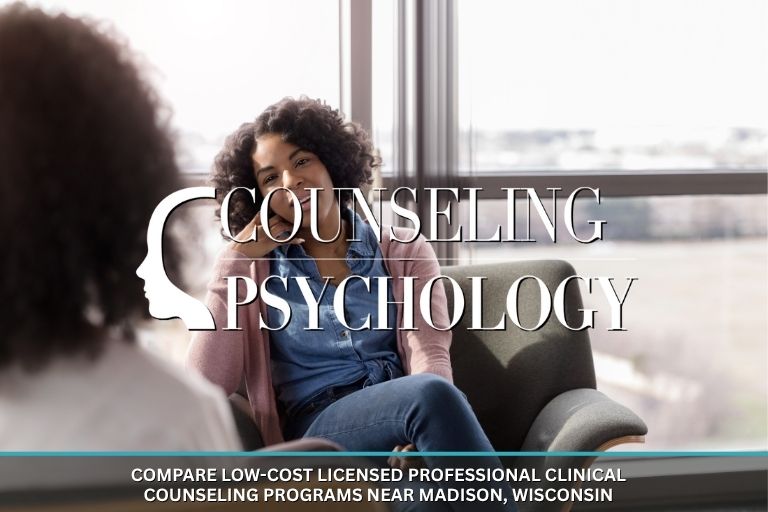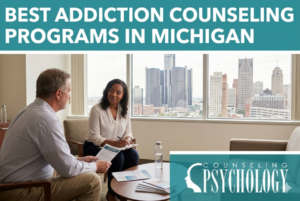Compare Low Cost Licensed Professional Clinical Counseling Programs Near Madison, Wisconsin

Madison, Wisconsin's capital and second-largest city, is known for its progressive values, dynamic university culture, and strong investment in public health. As awareness of mental health needs continues to grow in Wisconsin and beyond, demand for Licensed Professional Clinical Counselors (LPCCs) is rising. According to the Wisconsin Department of Health Services, Dane County has seen a surge in mental health related emergency visits over the past five years, especially among adolescents and college aged adults. This uptick has placed increased pressure on the behavioral health system and created new opportunities for counselors trained to meet evolving community needs.
In response, local universities and training institutions are offering more accessible, affordable pathways into the profession. From state-funded public schools to private institutions offering scholarship support, the Madison area is home to programs that provide high quality preparation for licensure without the burden of excessive tuition. For prospective counselors in the Madison region, affordability does not have to mean sacrificing quality. This guide explores low cost LPCC programs in and around Madison, examining accreditation, specializations, state licensure alignment, and local career opportunities.
2026 Budget-Friendly Licensed Professional Clinical Counseling Programs Near Madison, Wisconsin
University of Wisconsin-Whitewater
Whitewater, WI - Public 4-Year - uww.edu
Master's - Master of Science in Counseling (Clinical Mental Health Counseling)
Campus Based - Visit Website
The University of Wisconsin-Whitewater's Master of Science in Counseling stands out as an affordable, comprehensive Clinical Mental Health Counseling program. With a competitive resident tuition rate of $585.74 per credit, students can complete the CACREP-accredited 60-credit degree in three years through flexible full-time or part-time options. The program's strategic affordability stems from its state institution status and Wisconsin state funding. Graduates receive specialized training in mental health assessment and intervention techniques, preparing them for diverse counseling career paths. The military-friendly environment and comprehensive admission requirements make this program accessible for aspiring mental health professionals seeking quality education without excessive financial burden.
- 60-credit CACREP-accredited program
- Clinical Mental Health concentration
- Flexible full/part-time options
- Resident tuition $585.74 per credit
- Three-year completion path
- Comprehensive admission requirements
- State of Wisconsin licensure aligned
Wisconsin's Mental Health Landscape: Why LPCCs Are in Demand
Across Wisconsin, and particularly in Dane County, behavioral health has become a top priority. A 2023 report from the Wisconsin Department of Health Services identified an increase in mental health-related emergency visits, especially among young adults and adolescents. In response, statewide initiatives like the Resilient Wisconsin program aim to build trauma-informed services and expand the behavioral health workforce.
Licensed Professional Clinical Counselors are central to this effort. These professionals deliver therapy services, lead prevention and crisis intervention programs, and fill critical staffing gaps in schools, healthcare systems, and community agencies. Madison, with its vibrant nonprofit sector and integrated healthcare networks like UW Health, offers an ideal setting for clinical training and future employment.
What to Expect From an LPCC Program in Madison
Most LPCC programs are offered as master's degrees in Clinical Mental Health Counseling or Professional Counseling. These typically require 60 graduate credits and include coursework in ethics, assessment, group counseling, diagnosis, multicultural competence, and supervised clinical practice.
In Madison, many affordable programs offer flexible evening or hybrid formats to accommodate working professionals. Students may also benefit from practicum and internship placements in local agencies such as Journey Mental Health Center, Access Community Health Centers, or school-based mental health programs supported by Madison Metropolitan School District (MMSD). Some programs partner directly with state or county mental health initiatives, allowing students to gain hands-on experience addressing real-time needs in crisis response and trauma-informed care.
Sample LPCC Curriculum Overview
The curriculum in Madison-area programs is designed to meet both academic rigor and practical application standards. These core courses prepare students for the demands of licensure and clinical practice while offering specialized knowledge in key counseling domains.
| Core Course Area | Topics Covered |
| Counseling Theory and Practice | Evidence-based modalities, treatment planning |
| Human Growth and Development | Life span development, transitions, aging |
| Psychopathology and Diagnosis | DSM-5-TR criteria, differential diagnosis |
| Ethics and Legal Issues | Confidentiality, professional codes, state law |
| Multicultural Counseling | Cultural identity, equity, working with diverse populations |
| Supervised Practicum and Internship | 700+ hours of real-world clinical training |
Accreditation and Licensure in Wisconsin
For a program to qualify graduates for licensure in Wisconsin, it must be accredited by a recognized agency and meet educational requirements set by the Wisconsin Department of Safety and Professional Services (DSPS).
Key Licensing Requirements for LPCCs in Wisconsin
To become a licensed professional counselor in Wisconsin, individuals must meet several educational and supervised experience requirements. The following list outlines the primary criteria necessary for licensure:
- Completion of a 60-credit master's degree in counseling or a closely related field
- At least 700 hours of supervised practicum and internship
- Passing score on the National Counselor Examination (NCE) or National Clinical Mental Health Counseling Examination (NCMHCE)
- Completion of 3,000 hours of supervised post-master's experience
Wisconsin does not currently use the “LPCC” title formally; instead, the equivalent license is Licensed Professional Counselor (LPC). Prospective students should ensure any program they pursue aligns with this designation and prepares them to meet both academic and post-graduate requirements for full licensure.
Financial Aid and Cost-Saving Strategies
Navigating the cost of graduate school can be a challenge, but many financial aid options are available to aspiring counselors in Wisconsin. Public universities often offer lower tuition rates for in-state students, and some extend tuition reciprocity to residents of neighboring states.
Students can explore these financial support options:
- Wisconsin Higher Education Grants (WHEG): Available to eligible in-state graduate students attending participating institutions
- Graduate Assistantships: Offered through some UW system campuses; may cover partial tuition and include a stipend
- Employer Tuition Reimbursement: Commonly offered in Madison’s healthcare systems and nonprofit mental health agencies
Additional cost-saving measures include applying for scholarships specific to behavioral health or public service fields, enrolling part-time while working, or choosing hybrid or online formats that reduce commuting and housing costs.
Building a Career in Counseling in Madison
Graduates of LPC-aligned counseling schools in Wisconsin are well-positioned to enter a workforce that values clinical competence, cultural humility, and community engagement. The city's blend of public and private employers includes:
- UW Health and UnityPoint Health systems
- Journey Mental Health Center
- Madison Area Technical College (student support services)
- Nonprofit agencies such as Tellurian and Catholic Charities
Many entry-level counseling roles include clinical supervision toward full LPC licensure and allow professionals to work under a temporary training license. Employers often seek candidates with experience or training in trauma-informed care, substance use treatment, and culturally responsive practices.
In recent years, Madison has prioritized expanding mental health access for underserved communities, including LGBTQ+ individuals, immigrant and refugee populations, and low income residents. Counselors with specialized training in these areas or proficiency in multiple languages may find additional career opportunities and community-based roles.
Preparing for Long-Term Professional Growth
In addition to earning licensure, long term success as a Licensed Professional Counselor often depends on continued professional development. Counselors in Wisconsin can benefit from joining statewide organizations like the Wisconsin Counseling Association or attending annual training events hosted by the Wisconsin Department of Health Services. These resources offer ongoing education in emerging clinical practices, legislative updates, and opportunities for networking with peers. For those interested in specialization such as trauma therapy, school-based counseling, or integrated care, post-master's certificates and continuing education units (CEUs) are widely available through local universities and regional training centers.
As mental health care evolves to meet increasingly diverse community needs, counselors must be prepared not only to enter the field but to grow within it. Affordable, high quality programs in the Madison area offer a solid foundation for this journey. With the right combination of education, licensure preparation, and professional support, future counselors can build meaningful careers that contribute to Wisconsin's mental health workforce and create lasting impact in the lives of those they serve.
Sources
- Wisconsin Department of Safety and Professional Services
- Wisconsin Department of Health Services: Resilient Wisconsin
- Wisconsin Higher Educational Aids Board: WHEG
- Wisconsin Counseling Association



